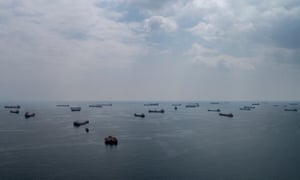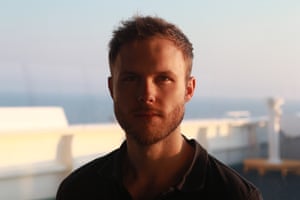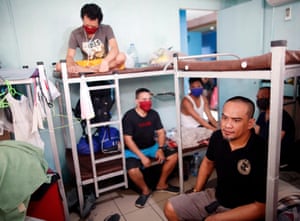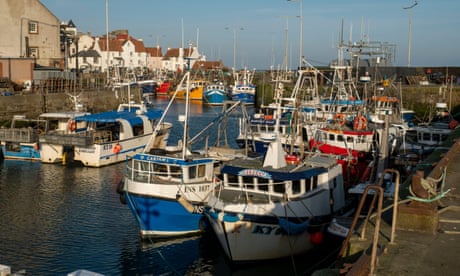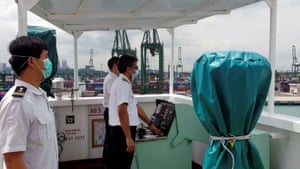Pro-Beijing leader pledges to overhaul school system, after weekend of heavy-handed police action
Helen Davidson and agencies
Mon 11 May 2020 THE GUARDIAN
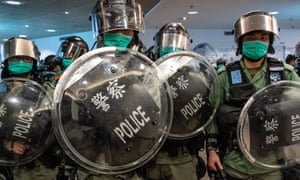
Riot police during a demonstration in a shopping mall in Hong Kong on Sunday. Photograph: Anthony Kwan/Getty Images
Hong Kong’s pro-Beijing leader, Carrie Lam, has vowed to overhaul the city’s education system, saying its liberal studies curriculum helped to fuel last year’s violent pro-democracy protests.
Her intervention follows a weekend of heavy-handed police responses to scattered protests across the city, with journalists pepper-sprayed and searched, at least 18 people injured, a 12-year-old student journalist detained, and an estimated 200 people arrested.
Lam described the current secondary school programme as a “chicken coop without a roof” and said her government would soon unveil its plans. She reportedly said students needed protection from being “poisoned” and fed “false and biased information”.
“In terms of handling the subject of liberal studies in the future, we will definitely make things clear to the public within this year,” she told the pro-government Ta Kung Pao newspaper in an interview published on Monday.
Lam has record low approval ratings as leader and is under increasing pressure from Beijing authorities frustrated with the pro-democracy protests which have besieged the city since June.
Recent weeks have seen extraordinary interventions by Beijing into Hong Kong affairs and warnings that it will not “stand idly by” while the “political virus” of protesters continue.
Flash mob protests were called for the weekend after a house committee meeting in Hong Kong’s legislative council turned violent on Friday afternoon, drawing groups mainly to shopping malls to chant slogans and sing, where they were met by large contingents of riot police.
Aaron Mc Nicholas(@aaronMCN)
This boy was asked by the police how old he was; he told them he was 13. He’s since been identified as being part of Student Depth Media.
The issue of secondary schoolers acting as reporters is a tough one, but he did nothing provocative and kept his cool while being singled out pic.twitter.com/W5vabppywlMay 10, 2020
On Sunday police chased protesters through the upmarket complexes and streets of Kowloon.
Live streams of the demonstrations showed police appearing to shoot pepper balls inside a mall where people were shopping and dining with families, pinning a child to the ground, and detaining two student journalists aged 12 and 16. Pandemic prevention laws were also used to issue fines against people for gathering.
Hong Kong police denied they arrested the two children, saying the minors were taken to the police station for their own safety, where their guardians were called to collect them. The mother of the younger boy told media police had threatened to fine her if he was seen again.
The police force said they entered the shopping malls to “stop protesters breaching to peace”, and responded in Mong Kok to protesters setting fires and “seriously disturbing the public order and posing a threat to public safety”.
Hospital officials told RTHK News 18 people presented to emergency rooms with injuries sustained during protests on Sunday, including the legislator Roy Kwong who was shown on live streams being forcefully held to the ground by police in Mong Kok, and a journalist who alleged a police officer had strangled her neck from behind for several seconds.
LO Kin-hei 羅健熙(@lokinhei)
this is the moment lawmaker Roy Kwong is subdued.
He was pushed forcefully to the ground, and riot police rushed to press his head onto the floor with their knees. pic.twitter.com/sTJ1KaYxoPMay 10, 2020
In Mong Kok a large group of reporters were kettled by police, told to kneel and stop filming, and prevented from leaving despite some appearing to have been affected by pepper spray.
Since the protests began last June there are growing concerns about police brutality and rule breaches occurring without consequence, including the targeting of journalists.
Damon Pang(@damon_pang)
#HongKongPolice has asked a large amount of #HongKong journalists to fall on their knees, asking mainstream media to group together & other web-based or student press to stay elsewhere in #MongKok. The reporters are asked to stop rolling their live streams #HongKongProtests pic.twitter.com/alKFoVujzzMay 10, 2020
Hong Kong’s pro-Beijing leader, Carrie Lam, has vowed to overhaul the city’s education system, saying its liberal studies curriculum helped to fuel last year’s violent pro-democracy protests.
Her intervention follows a weekend of heavy-handed police responses to scattered protests across the city, with journalists pepper-sprayed and searched, at least 18 people injured, a 12-year-old student journalist detained, and an estimated 200 people arrested.
Lam described the current secondary school programme as a “chicken coop without a roof” and said her government would soon unveil its plans. She reportedly said students needed protection from being “poisoned” and fed “false and biased information”.
“In terms of handling the subject of liberal studies in the future, we will definitely make things clear to the public within this year,” she told the pro-government Ta Kung Pao newspaper in an interview published on Monday.
Lam has record low approval ratings as leader and is under increasing pressure from Beijing authorities frustrated with the pro-democracy protests which have besieged the city since June.
Recent weeks have seen extraordinary interventions by Beijing into Hong Kong affairs and warnings that it will not “stand idly by” while the “political virus” of protesters continue.
Flash mob protests were called for the weekend after a house committee meeting in Hong Kong’s legislative council turned violent on Friday afternoon, drawing groups mainly to shopping malls to chant slogans and sing, where they were met by large contingents of riot police.
Aaron Mc Nicholas(@aaronMCN)
This boy was asked by the police how old he was; he told them he was 13. He’s since been identified as being part of Student Depth Media.
The issue of secondary schoolers acting as reporters is a tough one, but he did nothing provocative and kept his cool while being singled out pic.twitter.com/W5vabppywlMay 10, 2020
On Sunday police chased protesters through the upmarket complexes and streets of Kowloon.
Live streams of the demonstrations showed police appearing to shoot pepper balls inside a mall where people were shopping and dining with families, pinning a child to the ground, and detaining two student journalists aged 12 and 16. Pandemic prevention laws were also used to issue fines against people for gathering.
Hong Kong police denied they arrested the two children, saying the minors were taken to the police station for their own safety, where their guardians were called to collect them. The mother of the younger boy told media police had threatened to fine her if he was seen again.
The police force said they entered the shopping malls to “stop protesters breaching to peace”, and responded in Mong Kok to protesters setting fires and “seriously disturbing the public order and posing a threat to public safety”.
Hospital officials told RTHK News 18 people presented to emergency rooms with injuries sustained during protests on Sunday, including the legislator Roy Kwong who was shown on live streams being forcefully held to the ground by police in Mong Kok, and a journalist who alleged a police officer had strangled her neck from behind for several seconds.
LO Kin-hei 羅健熙(@lokinhei)
this is the moment lawmaker Roy Kwong is subdued.
He was pushed forcefully to the ground, and riot police rushed to press his head onto the floor with their knees. pic.twitter.com/sTJ1KaYxoPMay 10, 2020
In Mong Kok a large group of reporters were kettled by police, told to kneel and stop filming, and prevented from leaving despite some appearing to have been affected by pepper spray.
Since the protests began last June there are growing concerns about police brutality and rule breaches occurring without consequence, including the targeting of journalists.
Damon Pang(@damon_pang)
#HongKongPolice has asked a large amount of #HongKong journalists to fall on their knees, asking mainstream media to group together & other web-based or student press to stay elsewhere in #MongKok. The reporters are asked to stop rolling their live streams #HongKongProtests pic.twitter.com/alKFoVujzzMay 10, 2020
HK leader blames protests on education, vows system overhaul
AFP May 11, 2020




HK riot police enter a shopping mall to disperse protesters during demonstrations on Labour Day. (AP pic)
HONG KONG: Hong Kong’s pro-Beijing leader on Monday vowed to overhaul the city’s education system, arguing its liberal studies curriculum helped fuel last year’s violent pro-democracy protests.
Chief Executive Carrie Lam described the current secondary school programme as a “chicken coop without a roof” and said her government would soon unveil their plans.
“In terms of handling the subject of liberal studies in the future, we will definitely make things clear to the public within this year,” she told the pro-government Ta Kung Pao newspaper in an interview published Monday.
Her comments are likely to inflame those Hong Kongers who fear Beijing is chipping away at the freedoms that make the city a major international draw as political tensions rise once more.
With the backing of Beijing, Hong Kong’s government is pushing ahead with a bill that outlaws insulting China’s national anthem and leading pro-establishment figures are lobbying for an anti-sedition law.
The government says new legislation is needed to curb snowballing support – especially among younger Hong Kongers – for democracy and greater autonomy from China.
Opponents say the laws will cut back on free speech and do little to heal the city’s festering divides.
Hong Kong has some of Asia’s best schools and universities with academic freedoms unseen in mainland China.
Liberal studies was introduced in 2009 as a way to foster critical thinking with schools allowed to choose how they teach it.
But it has become a bete noire for Chinese state media and pro-Beijing politicians who have called for more patriotic education.
In Monday’s interview, Lam said she felt the classes allowed teachers to push their political biases and that greater oversight by the government was now needed.
Hong Kong was convulsed by seven straight months of often-violent youth-led pro-democracy protests last year, with millions hitting the streets.
More than 8,000 people have been arrested – around 17% of them secondary school students.
The mass arrests and the coronavirus pandemic ushered in a period of enforced calm.
But with the finance hub successfully tackling its Covid-19 outbreak – and social distancing measures easing – small protests have bubbled up.
On Sunday, riot police chased flash-mob protesters through multiple shopping malls.
They later used pepper spray and batons against protesters, bystanders and journalists in the district of Mong Kok.
Multiple arrests were made, many of them youngsters.
Lam has resisted calls for universal suffrage or an independent inquiry into the police’s handling of the protests.
In the New Year, she vowed to heal the divisions coursing through Hong Kong, but her administration has offered little in the way of reconciliation or a political solution.
Arrests and prosecutions have continued apace, while Beijing’s offices in the city sparked a constitutional row last month by announcing a greater say in how Hong Kong is run.
Hong Kong: Hundreds arrested as protest movement returns
Police say they have arrested 230 people, some as young as 12, after a weekend of pro-democracy demonstrations. Activists are concerned that pandemic lockdown measures will be used by China to roll back more rights.

Some 230 people were arrested in protests over the weekend in Hong Kong, local authorities said on Monday. Pro-democracy demonstrations have picked back up in the city after weeks of under a coronavirus-related lockdown.
Police said the detainees were between the ages of 12 and 65, and the charges ranged from assaulting an officer to failure to provide proof of identity. Democratic lawmaker Roy Kwong was amongst those arrested, officers said he was being charged with disorderly conduct. Video showed him being surrounded by police and pushed to the ground.
Read more: China: First foreign national prosecuted over Hong Kong protests
On Sunday, protestors had gathered for a sing-along event at a shopping mall when hundreds of riot police were called in to disperse the crowd. According to police, they also blocked roads in the city's Mongkok district and started fires.
Onlookers and journalists also got caught up in the ensuing clashes, with police firing tear gas at reporters and activists alike.
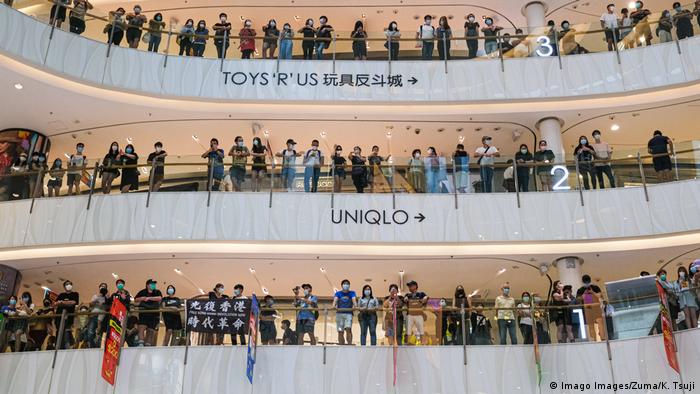
"Some journalists who were sprayed by pepper spray were not allowed to receive immediate treatment, and they were requested to stop filming," said Chris Yeung, chairman of the Hong Kong Journalists' Association.
Several people hospitalized
Footage of the scuffles, which included some people lying on the ground bleeding, were reminiscent of when Hong Kong was brought to a standstill by months of protests last year. At least 18 people had to be brought to local hospitals, the city's Hospital Authority said, including Kwong.
Read more: Lam Wing-Kee: Hong Kong bookseller fights back against China with Taiwan shop
There have been widespread worries amongst democracy advocates in Hong Kong that restrictions put in place to slow the spread of the pandemic will be used by China to further clamp down on rights. For example, a contact-tracing app meant to control who comes into contact with infected people may be used to target anti-Beijing protestors, activists have warned.
Current restrictions only allow public gatherings of a maximum of eight people.
Despite fears across Asia about a possible second wave of the virus, organizers are still planning to hold an annual mass pro-democracy rally on July 1. They say they are expecting two million people to join the even that marks the anniversary of Hong Kong was handed over from British to Chinese rule.
es/mm (AP, Reuters)
DW RECOMMENDS
EU condemns attacks on press freedom during COVID-19 crisis
Ahead of World Press Freedom Day, Germany's foreign minister said independent journalism is being weakened during the coronavirus pandemic. The EU also warned that media freedom is under threat in several countries. (02.05.2020)
Does US-China coronavirus blame game threaten scientific investigation?
China's need for official secrecy and the Trump administration's need for a coronavirus scapegoat, are combining to lend credibility to conspiracy theories. Could science become a victim of the politics of the pandemic? (08.05.2020)
Coronavirus: Travel boss urges EU to relax curbs on tourism
China has lifted its coronavirus ban on selling holiday packages, meaning the Hannover-based TUI Group can resume business. The group wishes the EU would consider doing the same. (04.05.2020)
China's export spike masks darker prospects
China's exports jumped 3.5% in April, with the country exporting millions of tons of medical products. But with demand in the EU and US likely to crash this year, the figures may mask a more complicated picture. (07.05.2020)
EU defends censorship of letter in Chinese newspaper
EU officials have backed a decision to accept China's censorship of a letter that ran in a Chinese newspaper. A sentence referencing China as the origin of the coronavirus outbreak was removed before publication. (07.05.2020)
AUDIOS AND VIDEOS ON THE TOPIC
Martin Lee: 'From now on, China's going to rule Hong Kong with an iron fist'
Date 11.05.2020
HONG KONG: Hong Kong’s pro-Beijing leader on Monday vowed to overhaul the city’s education system, arguing its liberal studies curriculum helped fuel last year’s violent pro-democracy protests.
Chief Executive Carrie Lam described the current secondary school programme as a “chicken coop without a roof” and said her government would soon unveil their plans.
“In terms of handling the subject of liberal studies in the future, we will definitely make things clear to the public within this year,” she told the pro-government Ta Kung Pao newspaper in an interview published Monday.
Her comments are likely to inflame those Hong Kongers who fear Beijing is chipping away at the freedoms that make the city a major international draw as political tensions rise once more.
With the backing of Beijing, Hong Kong’s government is pushing ahead with a bill that outlaws insulting China’s national anthem and leading pro-establishment figures are lobbying for an anti-sedition law.
The government says new legislation is needed to curb snowballing support – especially among younger Hong Kongers – for democracy and greater autonomy from China.
Opponents say the laws will cut back on free speech and do little to heal the city’s festering divides.
Hong Kong has some of Asia’s best schools and universities with academic freedoms unseen in mainland China.
Liberal studies was introduced in 2009 as a way to foster critical thinking with schools allowed to choose how they teach it.
But it has become a bete noire for Chinese state media and pro-Beijing politicians who have called for more patriotic education.
In Monday’s interview, Lam said she felt the classes allowed teachers to push their political biases and that greater oversight by the government was now needed.
Hong Kong was convulsed by seven straight months of often-violent youth-led pro-democracy protests last year, with millions hitting the streets.
More than 8,000 people have been arrested – around 17% of them secondary school students.
The mass arrests and the coronavirus pandemic ushered in a period of enforced calm.
But with the finance hub successfully tackling its Covid-19 outbreak – and social distancing measures easing – small protests have bubbled up.
On Sunday, riot police chased flash-mob protesters through multiple shopping malls.
They later used pepper spray and batons against protesters, bystanders and journalists in the district of Mong Kok.
Multiple arrests were made, many of them youngsters.
Lam has resisted calls for universal suffrage or an independent inquiry into the police’s handling of the protests.
In the New Year, she vowed to heal the divisions coursing through Hong Kong, but her administration has offered little in the way of reconciliation or a political solution.
Arrests and prosecutions have continued apace, while Beijing’s offices in the city sparked a constitutional row last month by announcing a greater say in how Hong Kong is run.
Hong Kong: Hundreds arrested as protest movement returns
Police say they have arrested 230 people, some as young as 12, after a weekend of pro-democracy demonstrations. Activists are concerned that pandemic lockdown measures will be used by China to roll back more rights.

Some 230 people were arrested in protests over the weekend in Hong Kong, local authorities said on Monday. Pro-democracy demonstrations have picked back up in the city after weeks of under a coronavirus-related lockdown.
Police said the detainees were between the ages of 12 and 65, and the charges ranged from assaulting an officer to failure to provide proof of identity. Democratic lawmaker Roy Kwong was amongst those arrested, officers said he was being charged with disorderly conduct. Video showed him being surrounded by police and pushed to the ground.
Read more: China: First foreign national prosecuted over Hong Kong protests
On Sunday, protestors had gathered for a sing-along event at a shopping mall when hundreds of riot police were called in to disperse the crowd. According to police, they also blocked roads in the city's Mongkok district and started fires.
Onlookers and journalists also got caught up in the ensuing clashes, with police firing tear gas at reporters and activists alike.

"Some journalists who were sprayed by pepper spray were not allowed to receive immediate treatment, and they were requested to stop filming," said Chris Yeung, chairman of the Hong Kong Journalists' Association.
Several people hospitalized
Footage of the scuffles, which included some people lying on the ground bleeding, were reminiscent of when Hong Kong was brought to a standstill by months of protests last year. At least 18 people had to be brought to local hospitals, the city's Hospital Authority said, including Kwong.
Read more: Lam Wing-Kee: Hong Kong bookseller fights back against China with Taiwan shop
There have been widespread worries amongst democracy advocates in Hong Kong that restrictions put in place to slow the spread of the pandemic will be used by China to further clamp down on rights. For example, a contact-tracing app meant to control who comes into contact with infected people may be used to target anti-Beijing protestors, activists have warned.
Current restrictions only allow public gatherings of a maximum of eight people.
Despite fears across Asia about a possible second wave of the virus, organizers are still planning to hold an annual mass pro-democracy rally on July 1. They say they are expecting two million people to join the even that marks the anniversary of Hong Kong was handed over from British to Chinese rule.
es/mm (AP, Reuters)
DW RECOMMENDS
EU condemns attacks on press freedom during COVID-19 crisis
Ahead of World Press Freedom Day, Germany's foreign minister said independent journalism is being weakened during the coronavirus pandemic. The EU also warned that media freedom is under threat in several countries. (02.05.2020)
Does US-China coronavirus blame game threaten scientific investigation?
China's need for official secrecy and the Trump administration's need for a coronavirus scapegoat, are combining to lend credibility to conspiracy theories. Could science become a victim of the politics of the pandemic? (08.05.2020)
Coronavirus: Travel boss urges EU to relax curbs on tourism
China has lifted its coronavirus ban on selling holiday packages, meaning the Hannover-based TUI Group can resume business. The group wishes the EU would consider doing the same. (04.05.2020)
China's export spike masks darker prospects
China's exports jumped 3.5% in April, with the country exporting millions of tons of medical products. But with demand in the EU and US likely to crash this year, the figures may mask a more complicated picture. (07.05.2020)
EU defends censorship of letter in Chinese newspaper
EU officials have backed a decision to accept China's censorship of a letter that ran in a Chinese newspaper. A sentence referencing China as the origin of the coronavirus outbreak was removed before publication. (07.05.2020)
AUDIOS AND VIDEOS ON THE TOPIC
Martin Lee: 'From now on, China's going to rule Hong Kong with an iron fist'
Date 11.05.2020



